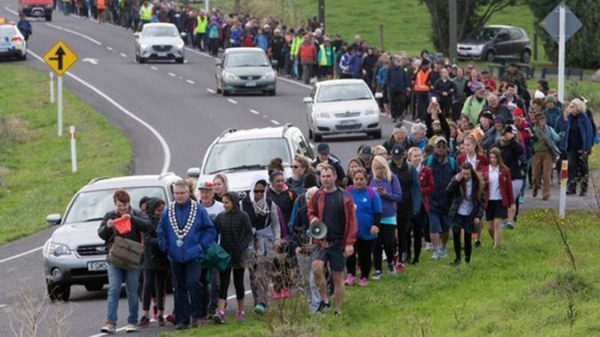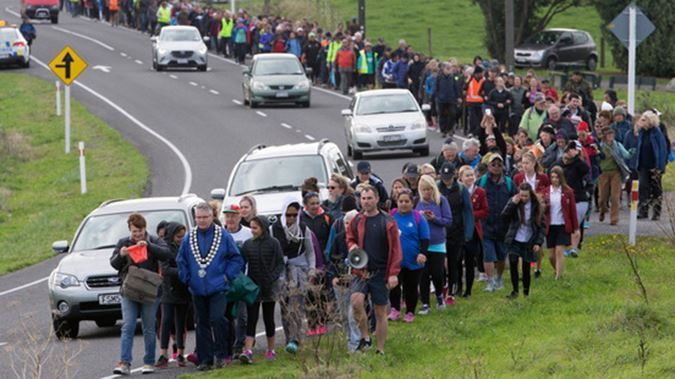
Big ups for New Plymouth mayor Andrew Judd who last week led a hikoi from New Plymouth to Parihaka to help local Pakeha get a better understanding of Te Ao Maori.
The march was initiated after Judd publicised his experiences revealing overt racism from Pakeha appalled at the prospect of dedicated Maori seats on the local council which Judd was proposing.
Judd revealed he had been spat at and verbally abused in front of his children for pushing the proposal. He talked about seeing more clearly the darker side of New Zealand’s racist underbelly and has spoken out about the need for Pakeha to engage with Maori to better understand their world, their culture, their needs and aspirations.
So the hikoi was dubbed a “peace march” with the aim to promote Pakeha understanding of Maori aspirations in a country where Maori so often face the “tyranny of the majority” whereby Maori views are frequently drowned as a minority in a majority Pakeha vote.
One way to avoid this deficit in our democracy is to have dedicated Maori seats on local councils, as we have in our national parliamentary representation, to ensure Maori views are represented in local decision making.
Maori representation on local councils is allowed for under the Local Electoral Act 2001 and requires a referendum of all voters to approve such a proposal. The majority of voters in places like the Far North, Rotorua, Tauranga, Wairoa and New Plymouth have already rejected dedicated Maori representation through referenda and the ACT Party vetoed such a proposal for Auckland during the establishment of the super city. Three dedicated Maori places had been proposed by the Royal Commission on Auckland Governance – two to be elected and one appointed by local mana whenua. However John Key’s government agreed with Local Government Minister Rodney Hide that this proposal be dropped.
The unfortunate result in Auckland, and to some extent elsewhere, is that Maori appointments are made to council committees by mainly Pakeha councillors rather than through election by Maori. Political patronage in this way ensures only conservative Maori views – ones that Pakeha are comfortable with – are heard at local government level.
Whatever you want to call it – it isn’t democracy and it isn’t Maori representation.
The last word here to Andrew Judd who has set a challenge to anyone standing in the local body elections later this year:
“Whoever stands in any council, not only here in Taranaki but throughout New Zealand, and indeed for the government, to represent us – if your strong view is that a Māori ward or a seat on a standing committee isn’t required, and you say you represent us, what work or effort have you done to engage in a Maori perspective to actually understand the unique bicultural relationship we have with tangata whenua?”
Let’s take up Judd’s challenge and actively encourage such a debate around these issues this year.






Clearly John Māori must have equal rights at least and be part of our local Goverence, as Māori need to be equal in every, so let it happen PLEASE.
MAORI HAVE SO MUCH GOOD FOR OTHERS TO BE ENRICHED WITH, AS MAORI ARE A CARING LOYAL PART OF OUR HUMANITY AND CAN MAKE US ALL BETTER FOR IT.
WHAT A WONDERFUL SIGHT AND YES MAORI SHOULD OFFER THEIR RICH CULTURAL SPIRITUAL QUALITIES TO OUR LOCAL GOVERNENCE.
Democracy, also known as “tyranny of the majority”, make no allowances for minorities or indigenous groups that’ve been over-whelmed by colonizers.
Andrew Judd is a principled man and should be congratulated for his actions.
What a wonderful place Aotearoa would be if we had more like him in Parliament, as well as local Councils!
Kia kaha, Mr Judd!
Of course Maori representation at local body level is useful and worthwhile, but to be so quick to abandon democratic process is a mistake and totally unnecessary. To maintain a voter-driven system is the only viable way I know to bestow legitimacy on a representative body and should not be sidelined without overwhelming evidence that to do so is the only way to achieve a desirable end. To use direct appointment to a council to introduce a broader input, opens every decision made by that body to immediate challenge by “constitutionalist” opponents.
But there are other ways to get to a similar outcome within the framework of democratic process.
For instance, if you are trying to select twelve representatives from a pool of, say, twenty applicants and if four applicants were Maori and if the rest were non-Maori, and if every elector has twelve votes and the 80% non-Maori voters are anti-Maori racists, you will not get a single Maori on that body. (Excuse me about the racist thing, I am trying to make a point). However, if each elector has only four votes, things even up considerably.
Now let us imagine that those four votes can be cast either for four different candidates, or all for a single candidate or in any other way you like. Suddenly a focused and committed minority has way more chance of electing representation.
And what is more, the concept of democratic selection in still respected.
Better, no?
Jeez, Nick, can you be any more complicated??? My eyes GLAZED OVER trying to make sense of your writing.
Let’s just make permanent maori seats available, without all the high-math needed to work through your system
I get a little confused when the majority want to ban Maori involvement in Councils and Government, under the TOW it was to be shared Governance, however when the Settlors got the balance of power in the 1850;s to 1860’s they screwed the playing field. Nothings changed in fact it has got worse, now it is the elitists wanting to screw over all the minorities not just the Maori’s but all lower socio economic groups.
Social engineering at it’s finest.
I get a little confused when the majority want to ban Maori involvement in Councils and Government, under the TOW it was to be shared Governance, however when the Settlors got the balance of power in the 1850;s to 1860’s they screwed the playing field. Nothings changed in fact it has got worse, now it is the elitists wanting to screw over all the minorities not just the Maori’s but all lower socio economic groups.
Social engineering at it’s finest.
If you’re confused, allow me to assist:
The majority isn’t banning Maori involvement in councils. They just need to get elected like every other group.
I think you may be a bit confused yourself, Andrew. Maori can’t easily be “lected like every other group” when they are a minority and the tyranny of the majority leaves them out in the cold every time.
Case in point is the New Plymouth District Council. Of the fifteen councillors and mayor, most are white, middle-aged pakeha male. There is only one Maori representative. (http://www.newplymouthnz.com/TheCouncilAndItsPeople/CouncilPeople/MayorAndCouncillors/)
Not exactly a democratic representation of out Treaty partner, is it?
I don’t know what the ratio of ‘Pakeha’ to ‘Maori’ is in that district, so is one in fifteen is under or over representation? I don’t know.
But looking at the national scene, a majority of voters who have Maori ancestry choose to be on the general electoral register rather than isolate themselves in a race-based enclave.
I find this most heartening! – an indication we’re slowly moving away from the apartheid electoral system we currently have. It can’t come soon enough.
The term ‘Maori’ is heading toward becoming meaningless anyway. There are zero pure blood Maori alive today and recent research indicates that a majority of people who call themselves ‘Maori’ are marrying other races. So give it a couple of generations and it will all be a non-issue.
Time to move on!
Move on you bigot ANDREW, AS YOU DONT OBVIOUSLY BELIEVE IN SHARING THE GOVERNENCE WITH our first peoples.
Perhaps you didn’t also support the US “positive discrimination bill” the US used to advance the minorities wellbeing judging by your apparent bigotry.
There’s only two women on the council. Is it time to demand equal representation?
One of the biggest barriers to diversity in local politics is the ward system – get rid of that and the chances of a more balanced representation increase substantially.
Thank you Andrew Judd. And sad to see some of the comments above that fail to recognise that NZ is a far the richer nation in having our maori culture – which has much to offer if one takes the time to inquire and is given the chance to participate in our local and central democracy.
Ross:
Indeed we are richer for having Maori culture!
But note that we are also richer for having British, Irish, Chinese, Thai, Korean, South African, Indonesian etc etc etc in this wonderful land.
Each brings something into the mix.
Comments are closed.